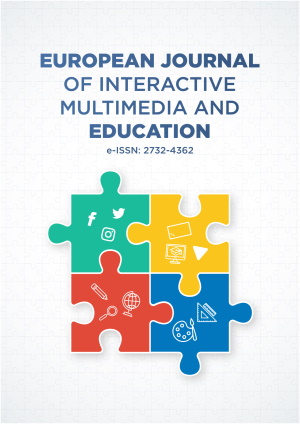Keyword: teachers
8 articles found.
Research Article
Digital competencies and the 21st century skills of university teachers in Nigeria
EUR J INTERACT MULTIMED ED, Volume 4, Issue 2, July 2023, Article No: e02305
https://doi.org/10.30935/ejimed/13966Research Article
Use of logic for improving the higher-order thinking skills of student teachers
EUR J INTERACT MULTIMED ED, Volume 4, Issue 2, July 2023, Article No: e02304
https://doi.org/10.30935/ejimed/13393Research Article
Science Teachers’ Level of Technological Knowledge and the Effect of Demographic Variables in Ondo State, Nigeria
EUR J INTERACT MULTIMED ED, Volume 3, Issue 1, January 2022, Article No: e02202
https://doi.org/10.30935/ejimed/11437Research Article
University Teachers’ Attitudes Towards Distance Learning During COVID-19 Pandemic: Hurdles, Challenges, and Take-away Lessons
EUR J INTERACT MULTIMED ED, Volume 3, Issue 1, January 2022, Article No: e02201
https://doi.org/10.30935/ejimed/11436Research Article
Teachers at Lock-Down: Generalized Anxiety Disorder and Attitude Towards E-Learning amidst COVID-19 Era
EUR J INTERACT MULTIMED ED, Volume 2, Issue 2, July 2021, Article No: e02113
https://doi.org/10.30935/ejimed/11288Research Article
Facing COVID-19 through Emergency Online Education Anchored in Khan’s Framework: Case of Philippine Teachers in Xi’an, China
EUR J INTERACT MULTIMED ED, Volume 2, Issue 1, January 2021, Article No: e02104
https://doi.org/10.30935/ejimed/9683Research Article
Teachers’ Perception, Experiences, and Challenges about Teens of Ages 12-14 Years who have Reported Online Digital Insecurity in Kenya
EUR J INTERACT MULTIMED ED, Volume 2, Issue 1, January 2021, Article No: e02102
https://doi.org/10.30935/ejimed/9360Research Article
Arab Pre-service Teachers’ Perspectives on the Role of ICT in Learning and beyond School
EUR J INTERACT MULTIMED ED, Volume 1, Issue 2, July 2020, Article No: e02008
https://doi.org/10.30935/ejimed/9138
